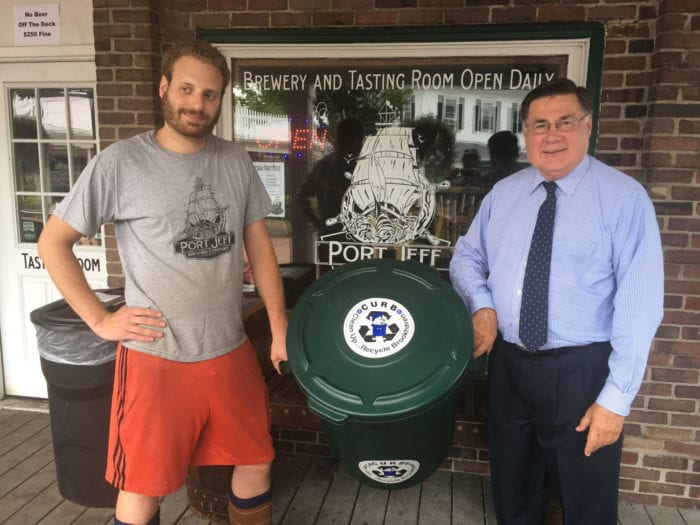New town program will recycle spent grains from Port Jeff brewery

By Alex Petroski
The next time you kick back to enjoy a Party Boat IPA or Schooner Pale Ale from the Port Jeff Brewing Company, just know you’re enjoying the suds for the greater good.
Brookhaven Town announced a partnership last week between the brewery, located in Port Jefferson, the town and Double D Bar Ranch in Manorville, a haven for abused or unwanted farm animals.
A by-product of brewing beer is literally tons of spent grains, which until now in Brookhaven would be tossed in the trash and transported via municipal garbage trucks to the landfill. A new town program, called Brew to Moo, will see regular pickups of the spent grains from the Port Jeff Brewing Company that will then be transported to the Manorville ranch, which will then be mixed into feed for the livestock on the premises. The spent grains have reduced caloric content but provide protein and fiber that can supplement corn for feed, according to a press release from the town. The Port Jeff Brewing Company is just the second brewery in Suffolk County to climb onboard with the town initiative, joining BrickHouse Brewery in Patchogue, which agreed to participate in the arrangement earlier this month.
“The fact that the beneficiary in this program is rescue animals really ices the cake for us.”
— Mike Philbrick
“When the town approached us about the Brew to Moo program we were instantly on board,” said Mike Philbrick in an email, the brewer and operator of the Port Jeff establishment. “Since our opening in 2011, we have searched for a secondary use for our spent grains. Unfortunately, we have been throwing them out most of the time with the exception of a few folks who use them as fertilizer accelerants. In other parts of the country, where agriculture and livestock is more prevalent, a brewer doesn’t have any difficulty finding a farmer to source the spent grain to. Long Island’s limited amount of livestock and Suffolk’s large amount of breweries created an anomaly not really seen elsewhere.”
Rich Devoe, the operator of Double D Bar Ranch, which is a nonprofit organization, said during a phone interview the roughly 400 animals living at the ranch never go hungry, but having a steady source of food from the two breweries will allow the organization to spend its donations and money from his own pocket elsewhere, like on barn repairs and fencing. He called the arrangement “great” and “very important.”
“The fact that the beneficiary in this program is rescue animals really ices the cake for us,” Philbrick said. “You have a product that is otherwise waste, being transported by trucks on empty routes that are already on the road, feeding animals that really need it. That’s three wins, not just two. So naturally we wanted to be a part of it and we are happy to help [Supervisor Ed Romaine] make this program a success.”
Romaine (R) said the days prior to the Brew to Moo program’s inception were a missed opportunity to carry out a personal mantra he has adopted during his years at the helm of the town.
“We’re interested in reduce, recycle, reuse,” he said in a phone interview. “This may be something that would be a model project for other towns to do. I think you’ll see in the future, we’re looking at other industries that have waste that we can reuse for allied industries. We’re looking at that every single day because we want to be on the cutting edge of waste management.”
Romaine added the town plans to reach out to more breweries and ranches to gauge interest and try to get others to participate in the sustainably sound project.






